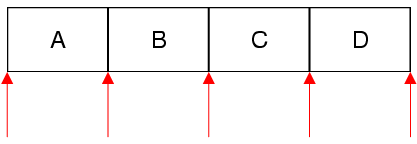Qt:–Ф–Њ–Ї—Г–Љ–µ–љ—В–∞—Ж–Є—П 4.3.2/qvectoriterator
–Ь–∞—В–µ—А–Є–∞–ї –Є–Ј Wiki.crossplatform.ru
| –Т–љ–Є–Љ–∞–љ–Є–µ: –Р–Ї—В—Г–∞–ї—М–љ–∞—П –≤–µ—А—Б–Є—П –њ–µ—А–µ–≤–Њ–і–∞ –і–Њ–Ї—Г–Љ–µ–љ—В–∞—Ж–Є–Є –љ–∞—Е–Њ–і–Є—В—Б—П –Ј–і–µ—Б—М |
__NOTOC__
|
–У–ї–∞–≤–љ–∞—П ¬Ј –Т—Б–µ –Ї–ї–∞—Б—Б—Л ¬Ј –Ю—Б–љ–Њ–≤–љ—Л–µ –Ї–ї–∞—Б—Б—Л ¬Ј –Ъ–ї–∞—Б—Б—Л –њ–Њ –≥—А—Г–њ–њ–∞–Љ ¬Ј –Ь–Њ–і—Г–ї–Є ¬Ј –§—Г–љ–Ї—Ж–Є–Є |
[–њ—А–∞–≤–Є—В—М] QVectorIterator Class Reference
[–Љ–Њ–і—Г–ї—М QtCore ]
The QVectorIterator class provides a Java-style const iterator for QVector and QStack. More...
#include <QVectorIterator>[–њ—А–∞–≤–Є—В—М] –Ю—В–Ї—А—Л—В—Л–µ —Д—Г–љ–Ї—Ж–Є–Є
- QVectorIterator ( const QVector<T> & vector )
- bool findNext ( const T & value )
- bool findPrevious ( const T & value )
- bool hasNext () const
- bool hasPrevious () const
- const T & next ()
- const T & peekNext () const
- const T & peekPrevious () const
- const T & previous ()
- void toBack ()
- void toFront ()
- QVectorIterator & operator= ( const QVector<T> & vector )
[–њ—А–∞–≤–Є—В—М] –Я–Њ–і—А–Њ–±–љ–Њ–µ –Њ–њ–Є—Б–∞–љ–Є–µ
The QVectorIterator class provides a Java-style const iterator for QVector and QStack.
QVector has both Java-style iterators and STL-style iterators. The Java-style iterators are more high-level and easier to use than the STL-style iterators; on the other hand, they are slightly less efficient.
An alternative to using iterators is to use index positions. Most QVector member functions take an index as their first parameter, making it possible to access, insert, and remove items without using iterators.
QVectorIterator<T> allows you to iterate over a QVector<T> (or a QStack<T>). If you want to modify the vector as you iterate over it, use QMutableVectorIterator<T> instead.
The QVectorIterator constructor takes a QVector as argument. After construction, the iterator is located at the very beginning of the vector (before the first item). Here's how to iterate over all the elements sequentially:
QVector<float> vector; ... QVectorIterator<float> i(vector); while (i.hasNext()) qDebug() << i.next();
The next() function returns the next item in the vector and advances the iterator. Unlike STL-style iterators, Java-style iterators point between items rather than directly at items. The first call to next() advances the iterator to the position between the first and second item, and returns the first item; the second call to next() advances the iterator to the position between the second and third item, returning the second item; and so on.
Here's how to iterate over the elements in reverse order:
QVectorIterator<float> i(vector); i.toBack(); while (i.hasPrevious()) qDebug() << i.previous();
If you want to find all occurrences of a particular value, use findNext() or findPrevious() in a loop.
Multiple iterators can be used on the same vector. If the vector is modified while a QVectorIterator is active, the QVectorIterator will continue iterating over the original vector, ignoring the modified copy.
See also QMutableVectorIterator and QVector::const_iterator.
[–њ—А–∞–≤–Є—В—М] –Ю–њ–Є—Б–∞–љ–Є–µ —Д—Г–љ–Ї—Ж–Є–є-—З–ї–µ–љ–Њ–≤
[–њ—А–∞–≤–Є—В—М] QVectorIterator::QVectorIterator ( const QVector<T> & vector )
Constructs an iterator for traversing vector. The iterator is set to be at the front of the vector (before the first item).
See also operator=().
[–њ—А–∞–≤–Є—В—М] bool QVectorIterator::findNext ( const T & value )
Searches for value starting from the current iterator position forward. Returns true if value is found; otherwise returns false.
After the call, if value was found, the iterator is positioned just after the matching item; otherwise, the iterator is positioned at the back of the container.
See also findPrevious().
[–њ—А–∞–≤–Є—В—М] bool QVectorIterator::findPrevious ( const T & value )
Searches for value starting from the current iterator position backward. Returns true if value is found; otherwise returns false.
After the call, if value was found, the iterator is positioned just before the matching item; otherwise, the iterator is positioned at the front of the container.
See also findNext().
[–њ—А–∞–≤–Є—В—М] bool QVectorIterator::hasNext () const
Returns true if there is at least one item ahead of the iterator, i.e. the iterator is not at the back of the container; otherwise returns false.
See also hasPrevious() and next().
[–њ—А–∞–≤–Є—В—М] bool QVectorIterator::hasPrevious () const
Returns true if there is at least one item behind the iterator, i.e. the iterator is not at the front of the container; otherwise returns false.
See also hasNext() and previous().
[–њ—А–∞–≤–Є—В—М] const T & QVectorIterator::next ()
Returns the next item and advances the iterator by one position.
Calling this function on an iterator located at the back of the container leads to undefined results.
See also hasNext(), peekNext(), and previous().
[–њ—А–∞–≤–Є—В—М] const T & QVectorIterator::peekNext () const
Returns the next item without moving the iterator.
Calling this function on an iterator located at the back of the container leads to undefined results.
See also hasNext(), next(), and peekPrevious().
[–њ—А–∞–≤–Є—В—М] const T & QVectorIterator::peekPrevious () const
Returns the previous item without moving the iterator.
Calling this function on an iterator located at the front of the container leads to undefined results.
See also hasPrevious(), previous(), and peekNext().
[–њ—А–∞–≤–Є—В—М] const T & QVectorIterator::previous ()
Returns the previous item and moves the iterator back by one position.
Calling this function on an iterator located at the front of the container leads to undefined results.
See also hasPrevious(), peekPrevious(), and next().
[–њ—А–∞–≤–Є—В—М] void QVectorIterator::toBack ()
Moves the iterator to the back of the container (after the last item).
See also toFront() and previous().
[–њ—А–∞–≤–Є—В—М] void QVectorIterator::toFront ()
Moves the iterator to the front of the container (before the first item).
[–њ—А–∞–≤–Є—В—М] QVectorIterator & QVectorIterator::operator= ( const QVector<T> & vector )
Makes the iterator operate on vector. The iterator is set to be at the front of the vector (before the first item).
See also toFront() and toBack().
| Copyright © 2007 Trolltech | Trademarks | Qt 4.3.2
|

